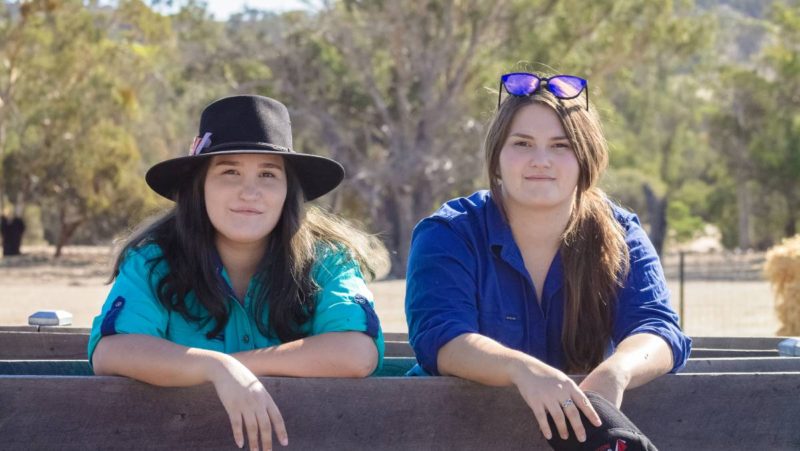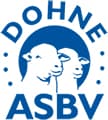Sisters Back Themselves in Sheep Industry
By Mollie Tracey Farm Weekly
WITH a strong family history of farming from both sides of their parents, it’s likely that sisters Haylee, 22 and Alanah Boxall, 19, would choose a career in agriculture.
But that wasn’t always the case for these third-generation Arthur River farmers.

Farming sisters Haylee (left) and Alanah Boxall, Arthur River, share a love for the sheep industry.
While their childhood of growing up on a farm planted their love for agriculture at an early age, the decision to forge their own path in the industry only came when they were young adults.
And they have since become passionate advocates for agriculture, in particular the sheep industry.
“Despite enjoying working on farms and with livestock all my life, my passion for agriculture didn’t blossom until I took an agricultural science unit at university,” Haylee said.
“Although only an elective at the time, it really ignited a passion for agriculture and led me to switch my degree to one that included agricultural science.”
While Alanah had always loved agriculture, early on her sights were set on becoming a teacher.
But after taking a gap year and re-evaluating what she wanted to do in life, she changed her degree and hopes to start studying agricultural science or agribusiness next year.
“My passion for the ag industry really pushed me to rethink my study/career path,” Alanah said.
“I’m back and forth from the city at the moment.
“One of my favourite things is travelling back home – it’s such a nice feeling once you get out past the forest on the Albany Highway and into farming country.”
Their family runs a mostly sheep enterprise, with Merino ewes which in the past were bred with Poll Dorset rams to target local and export markets.
But in the past year they have moved away from crossbreds to now running dual purpose Dohne Merinos with traditional Merino wool traits and good meat qualities.
The sisters have a shared passion for sharing the truth about the sheep industry and after seeing continued misrepresentation in the mainstream media and on social media, they decided to do something about it.
They’re known as ‘The Sheep Girls’ on Instagram (@thesheepgirls), which is an advocacy and educational page that they started about a year ago.
They use beautiful and creative photos of the industry and their farm to get their message across.
“We feel that there is still such a large information gap between people in agriculture and those who are not,” they said.
“Social media can be a great educational resource and we’d like to use our platform to show the reality of sheep farming, our systems and practices and to share what living on the land is like, as well as showcasing our sheep.
“It’s important that as more misinformation is spread about agriculture, that there are people out there to support and advocate for one of the most important industries in Australia.”
These young farmers are very aware of the issues that their generation will face in agriculture.
While this current time is often regarded as the most exciting time in agriculture’s history with more innovation, technology and scientific breakthroughs, it is also arguably one of the most challenging, with climate change, the spread of misinformation about farming practices, criticism of chemical use and foreign political tensions among the issues to be faced.
While this can be daunting for the up and coming generation of agriculture, the Boxall sisters see these challenges as opportunities for the industry to improve and they aim to be part of it.
“As part of the younger generation in the ag sector there is a sense of pressure to do things better, or to fix things and we think as more people are exploring alternative methods and are looking at better farming practices, the road to dealing with certain issues becomes a lot clearer,” they said.
“There is a lot of misinformation about farming practices and there seems to be a trend in the media about how farming is portrayed – in most cases the worst aspects get the largest amount of coverage.
“We would like to help this narrative change.”
To achieve this, the sisters see education as a main tool to share the issues agriculture faces with non-industry people in a way they can understand and find interesting.
Issues such as sustainable intensification, climate change and chemical usage, how animal welfare is constantly being improved, how farmers are adapting to the modern ways of producing, educating about targets that Australian farmers need to meet in terms of production percentages for the agricultural industry to continue expanding, are at the forefront of Haylee and Alanah’s minds.
While the sisters have a common passion for sheep, their particular areas of interest and skills slightly differ, although complement each other.
Haylee hopes to be involved with agriculture research and education, particularly sheep.
Less hands-on than her sister, Haylee prefers to focus on “researching new ways of doing things and analysing how well new practices are or aren’t working”.
“While I’m interested in the sheep industry as a whole, I have more interest in the wool sector,” Haylee said.
“I particularly like the Dohne breed for their ability to be used as a dual purpose sheep, for both wool and meat, and I am glad our farm has transitioned away from producing mostly crossbred lambs.”
Being in the paddock or shearing shed is Alanah’s happy place and she has a real love for the practical side of sheep farming.
“I love doing stock work and working with animals – my favourite time of the year is lambing and shearing,” Alanah said.
“There is just something about seeing paddocks full of ewes and lambs which makes me smile.
“Shearing, on the other hand, I love because of the hustle and bustle of the shed, the sound of the hand pieces going, sheep’s hooves on the grating and the smell of the lanolin in the wool.”
Alanah is equally passionate about the meat and wool sector as “in most cases, you don’t have one without the other”, which relates to her preferred breed choices of Merinos and Dohnes.
“My favourite breed is the traditional Merino because of its wool, but I like Dohnes as they have a smaller birth weight which is less stressful to the ewes during pregnancy and labour and they also have a fast-growing rate which makes them ready for sale quicker than Merinos, as well as being dual purpose.”
While women have gained more of a profile in agriculture in recent times, it is still a male-dominated industry.
Although the sisters are no strangers to casual sexism in the industry, they have turned that into motivation rather than being turned away.
“There are undoubtedly still people in agriculture that believe women can’t succeed in the industry as well as their male counterparts, but every time I experience casual sexism because I’m a woman in this industry, it makes me more determined to succeed,” Haylee said.
“I see more women interested in agriculture and in the future it will be brilliant to see this reflected in the increasing percentage of women in agriculture.”
Alanah said having more women in agricultural leadership roles was crucial to accurately reflect the industry.
“This representation is so important as it reflects the reality of farming at the moment, with half of ag industry workers being female,” she said.
“I think every woman, especially young women, in the industry has faced the same issue of not being listened to, having their ideas and opinions bulldozed by a bloke and while it hasn’t happened a lot to me, I’m sure it will in the future.
“This hasn’t put me off working in ag, in fact I think it has motivated me more and to prove that women do have an important place in the ag sector.”
In terms of what lies ahead for Haylee and Alanah as they are in the midst of their studies, both know that agriculture is where they want to be.
They also hope to see their family farm grow, introduce more sustainable intensification practices (achieving higher yields with little to no further environmental damage) and pair any new practices with economic viability.










 Facebook
Facebook YouTube
YouTube Instagram
Instagram